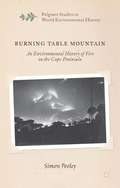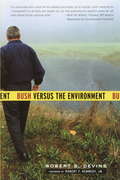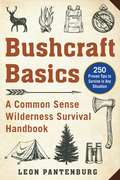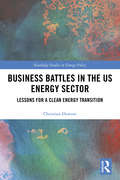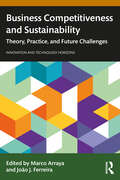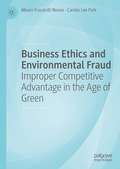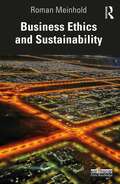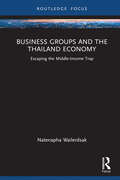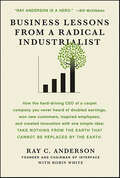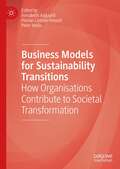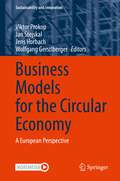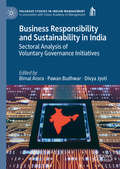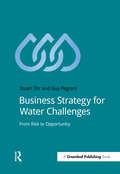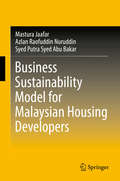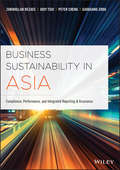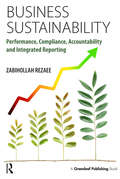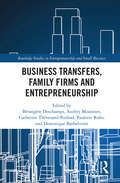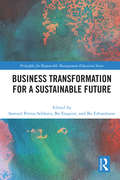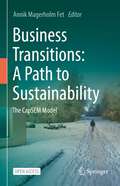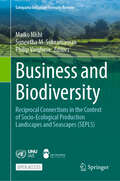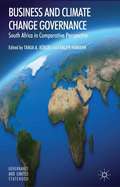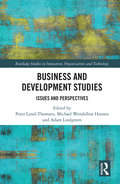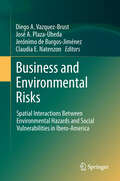- Table View
- List View
Burning Table Mountain
by Simon PooleyThis is an environmental history of humans and wildfire on the Cape Peninsula, from the practices of Khoikhoi herders to the conflagrations of January 2000. The book examines how the region's unique, famously diverse fynbos vegetation has been transformed since European colonial settlement, through urbanisation and biological modifications.
Bush Versus the Environment
by Robert S. DevineSince becoming president, George W. Bush has walked away from the Kyoto Protocol, pushed for oil drilling in the Arctic National Wildlife Refuge, undermined protections for endangered species and wilderness, and retreated from his campaign pledge to regulate carbon dioxide. But the president’s agenda reaches deeper than these well-known policies. InBush Versus the Environment, Robert Devine shows how the White House is quietly undermining the entire system of environmental safeguards that has developed over the past thirty years. The administration's tactics include: -Encouraging lawsuits against the federal government that challenge existing environmental laws, and then feebly defending the cases in court. -Ignoring science that doesn’t support the president's goals, and pressuring government scientists to produce the results the administration wants. -Using fuzzy math to overestimate the costs and underestimate the benefits of regulations that protect human health and the environment, which can lead to the elimination of much-needed rules. These are just a few of the administration’s strategies, which are being pursued beneath the radar of a public that overwhelmingly supports environmental protections. Bush Versus the Environmentis a compelling and important look at one of the most important issues facing America today, one that will have consequences that last long after Bush has left office. From the Trade Paperback edition.
Bushcraft Basics: A Common Sense Wilderness Survival Handbook
by Leon PantenburgBe ready for any emergency, at any time. Could you survive in the wilderness on your own? From clothing recommendations to picking the best firestarter, expert survival instructor Leon Pantenburg shares his immense knowledge of bushcraft and survivalist skills so that anyone—backpackers, preppers, city dwellers, and more—can be ready for a possible emergency. In Bushcraft Survival, Pantenburg delivers practical tips and anecdotes that cater to readers who are looking to improve their outdoor skills and prepare for every potential disaster. Drawing from his personal experience as an avid outdoorsman and years as a journalist, Pantenburg lays out easy-to-follow steps to prep for both short and long-term survival situations. As natural disasters become increasingly present and people continue to rely on reality television shows for survival tips, developing bushcraft abilities is becoming more and more important. In this thorough handbook, Pantenburg covers a wide range of topics, including: Developing a survival mindsetCrafting survival kitsChoosing clothing best suited to survivalPicking materials and objects to help you surviveBuilding a variety of sheltersDeciding what survival tools you should pack and which you should leave at homeEffectively make a fire using different techniques Filled with time-tested techniques and first-hand experience, Bushcraft Survival is the ideal book for those who want to step up their hiking or camping game, as well as those who are searching for relevant advice on emergency preparedness.
Business Battles in the US Energy Sector: Lessons for a Clean Energy Transition (Routledge Studies in Energy Policy)
by Christian DownieThis book is ground breaking in its study of business actors in climate and energy politics. While various studies have demonstrated the influence of business actors across multiple policy domains, this is the first to examine the behaviour of business actors in energy centric industries in the US that will be vital for achieving a clean energy transition, namely the oil, gas, coal, utility, and renewable industries. Drawing on almost 80 interviews with senior energy executives, lobbyists, and policymakers, it asks two central questions: (i) how and why are business actors shaping energy policy contests in the US? And (ii) what are the implications for policymakers? In answering these questions, this book provides new insights about the preferences and strategies of business in the energy sector, and, significantly, it identifies strategies for policymakers seeking to regulate energy in the face of political resistance from incumbent fossil fuel industries. This book will be of particular value to students, scholars, and policymakers working in the fields of energy, climate, and environmental politics, as well as individuals generally interested in the role that business exerts over policy processes.
Business Competitiveness and Sustainability: Theory, Practice, and Future Challenges (Innovation and Technology Horizons)
by João J. Ferreira Marco ArrayaThis book presents seven internal dimensions that have a direct impact on an organization’s global competitiveness and sustainability: purpose, leadership, passion, people-centered, customer-centric, infrastructure, and viability.An organization operates as a complex adaptive system that is impacted by external factors that make up its environment. These external factors, in turn, compel managers to make decisions and take deliberate actions that stimulate the organization's internal dimensions to enhance its competitiveness. Therefore, a competitive organization achieves a sustained level of productivity that leads to growth and the attainment of its objectives, resulting in increased income and well-being. Chapters in this book provide readers with a framework that demonstrates how these dimensions can be studied and analyzed individually, as well as how cultivating a coherent, mutually reinforcing system can enhance an organization's competitive advantage. This book also includes illustrative case studies and proposes an instrument to measure an organization's competitiveness.Providing a strategic framework for enhancing competitiveness in VUCA environments, this book will interest scholars and students in strategic management, competitiveness, innovation, and international business.
Business Ethics and Environmental Fraud: Improper Competitive Advantage in the Age of Green
by Mauro Fracarolli Nunes Camila Lee ParkAs environmental legislation grows more stringent in response to the escalating climate crisis, some of the world’s largest corporations have adopted fraudulent mechanisms to keep their margins of profit, and achieve improper competitive advantage. Such mechanisms can lead to problems in the supply chain, a decrease in market value, diminished trust in brands, increased surveillance of companies, as well as damage to the environment. This book offers a holistic view of the nature and consequences of environmental fraud, bringing together practical examples, empirical research data, and management theory. It will be of interest to academics working in the fields of sustainability management, business ethics, and corporate social and environmental responsibility.
Business Ethics and Sustainability
by Roman MeinholdThis book equips readers with the knowledge, insights and key capabilities to understand and practice business activities from ethical and sustainable vantage points. In our interconnected global business environment, the impacts of business activities are under increased ethical scrutiny from a wide range of stakeholders. Written from an international perspective, this book introduces the theory and practice of ethical and sustainable business, focusing in particular on eco-environmental sustainability, intergenerational responsibilities, current disruptive technologies, and intercultural values of the business community and consumers. Written by an expert author who also brings to the fore non-Western concepts and themes, this book: features positive case studies, as well as transferrable and applicable key insights from such cases; highlights the importance of taking cultural differences into account; takes a transdisciplinary approach which considers findings from research fields including conceptual and empirical business ethics, behavioral economics, ecological economics, environmental ethics, and the philosophy of culture; weaves in pedagogical features throughout, including up-to-date case studies, study questions, thought experiments, links to popular movies, and key takeaways. Written in an accessible and student-friendly manner, this book will be of great interest to students of business ethics, environmental ethics, applied ethics, and sustainable development, as well as business practitioners striving toward ethical, sustainable, and responsible business practice.
Business Groups and the Thailand Economy: Escaping the Middle-Income Trap (Routledge Focus on Business and Management)
by Natenapha WailerdsakBusiness Groups and the Thailand Economy examines the role of business groups, specifically state, local, and foreign capitals in the economic development of emerging economies and highlights why business groups are essential in helping a country break out of the middle-income trap. Wailerdsak reviews Thailand’s industrial and economic growth strategies through the local and international investors and explains why business groups are one of the key drivers of economic advancement and why they help to avoid the middle-income trap. The author also examines their business power expansion methods, including selection and specialization, political influence, mergers and acquisitions, outward FDI and business alliances. The book concludes with policy recommendations of how the government can engage business groups to accelerate high-tech industrialization and create jobs.The middle-income trap issue faced by Thailand would be of interest to many emerging economies, especially scholars and policymakers researching on Asian business and management, Asian economies, developmental economics, political economy, policy studies, corporate governance, entrepreneurship, and private company strategic management in emerging countries.
Business Lessons from a Radical Industrialist
by Robin White Ray C. AndersonIn 1994, Interface founder and chairman Ray Anderson set an audacious goal for his commercial carpet company: to take nothing from the earth that can't be replaced by the earth. Now, Anderson leads the way forward and challenges all of industry to share that goal, withBusiness Lessons from a Radical Industrialist.The Interface story is a compelling one: in 1994, making carpets was a toxic, petroleum-based process, releasing immense amounts of air and water pollution and creating tons of waste. Fifteen years after Anderson's call for change, Interface has: —cut greenhouse gas emissions by 82%—cut fossil fuel consumption by 60%—cut waste by 66%—cut water use by 75%—invented and patented new machines, materials, and manufacturing processes—increased sales by 66%, doubled earnings, and raised profit margins With practical ideas and measurable outcomes that every business can use, Anderson shows that profit and sustainability are not mutually exclusive; businesses can improve their bottom lines and do right by the earth. Ray Anderson is featured in the film, So Right, So Smart, which takes a behind-the-scenes look at how his leadership transformed Interface into a company with a sustainable business practices that made it more profitable than it was before.
Business Mathematics and Statistics Volume 2 class 12 - Tamil Nadu Board - SCERT: வணிகக் கணிதம் மற்றும் புள்ளியியல் தொகுதி 2
by State Council of Educational Research TrainingKey Factors about the book: Learning objectives are brief statements that describe what students will be expected to learn by the end of school year, course, unit, lesson or class period. Additional information about the concept. Amazing facts, Rhetorical questions to lead students to Mathematical inquiry. Assess students' critical thinking and their understanding. To enhance digital skills among students. List of digital resources.
Business Models for Sustainability Transitions: How Organisations Contribute to Societal Transformation
by Peter Wells Florian Lüdeke-Freund Annabeth AagaardCan innovations in business change society? Can innovations in society change business? These two questions have become critically urgent in recent years, but are rarely considered together. ‘Business Models for Sustainability Transitions’ therefore asks, can contemplating both concepts together result in a flourishing, sustainable future? Technology alone cannot save us. We cannot consciously consume our way out of trouble. This book represents a start at bridging the dynamic world of business model innovation with the constant and unprecedented transitions underway in the world around us. For researchers, practitioners, and policy makers, the coupling of the two questions has the potential to unlock answers to our grand global challenges with responses that are at the same time rapid and enduring. This work offers unique and considered glimpses into what it may take to harness wide-ranging innovations for the collective good.
Business Models for the Circular Economy: A European Perspective (Sustainability and Innovation)
by Jan Stejskal Jens Horbach Wolfgang Gerstlberger Viktor ProkopIncreased ecological awareness and the growing scarcity of resources have led to the introduction of new environmental standards, triggering enterprises, regions, and even countries to adopt new business models and industrial reconversion approaches. However, despite increased interest in business models and their innovation, it still lacks the integration of circularity and sustainability and to date research on these areas is still limited. This book, therefore, provides readers with a closer picture of the issues of business models and their innovation for the circular economy in Europe, where the issues of sustainability and the shift towards the circular economy have become cornerstones of European policies and documents and where significant differences have been identified between firms and countries. This book provides a unique view of different European perspectives and enables the reader to compare the situation in countries with completely different historical and economic conditions as well as with different perceptions of the need for the actions leading to the sustainable development and to the shift towards the circular economy.
Business Responsibility and Sustainability in India: Sectoral Analysis of Voluntary Governance Initiatives (Palgrave Studies in Indian Management)
by Pawan Budhwar Bimal Arora Divya JyotiOn the backdrop of the institutionalisation of corporate social responsibility (CSR) and sustainability, and the emergence of multi-stakeholder-driven voluntary regulation, this timely collection places special emphasis on India and explores its international voluntary sustainability standards. The authors analyse the adoption and implementation of voluntary governance initiatives across a range of industries, offering insightful sectoral discussion and evaluation of voluntary sustainability standards as forms of transnational private regulation. This book will be of interest to anyone researching CSR, sustainability and supply chain management in emerging markets.
Business School Internationalisation in a Changing World (EFMD Management Education)
by Matthew WoodThis is the Open Access edition of Global Focus from the European Foundation for Management Development (EFMD). Global Focus has become one of the most authoritative resources for in-depth analysis and updates on international management development. With features, topical reports, thought leadership and insight from leading experts from academia, business schools, companies and consultancies, this edition focuses on business school internationalisation.This eighteenth volume focuses on the impact of Artificial Intelligence (AI), with insights into topics such as the role of AI in corporate learning by Martin Moehrle, reshaping business education using hands-on AI by Ana Freire, and whether generative AI is a threat to the world of teaching and learning by Pär Mårtensson and John Mullins. The topic of the impact of business school research is explored by Kai Peters and Howard Thomas, and Usha Haley, Cary Cooper and Andrew Jack look at societal impact through sustainable scholarship. Chapters also focus on important aspects of working in business and business schools, such as Dan Pontefract’s discussion of loneliness both within and beyond the workplace and the importance of ‘finding your people’, and insights for developing an international scholar career presented by Miguel Córdova.This book will be of value and interest to those working in business schools and higher education leaders, as well as policy makers and business leaders seeking insight into how management education will be shaped to support business and wider society.
Business Strategy for Water Challenges: From Risk to Opportunity (Doshorts Ser.)
by Stuart Orr Guy PegramWater is a resource under increased stress, with its management now cited as one of the greatest risks to business continuity and growth. This concise guide for professionals offers strategic steps for developing a corporate water stewardship strategy. It will enable you to: define business water risks, and the opportunities associated with those risks; explore, through sector-specific profiles, risks associated with regulation, reputation, external response and engagement, and physical incidents; develop a clear plan and process for creating, managing and mainstreaming a corporate water strategy; identify several initiatives and new risk tools that your company can use to stay on top of best practice in water management. With the advent of risk tools, and a growing list of testaments around business risk from water, we are now able to respond more appropriately to how this resource is impacted by and impacts upon business. Use this book as your guide as you begin to build your company's strategy around water.
Business Sustainability Model for Malaysian Housing Developers
by Mastura Jaafar Azlan Raofuddin Nuruddin Syed Putra Syed Abu BakarThis book presents interviews with 20 successful Malaysian housing developers, to provide real-world insights and practical know-how for future developers. It is designed in a way that reveals the secrets of successful developers, from their origins to their current status with the interviews conducted in a semi-structured manner so that the interviewees were able to freely share their experiences, thoughts, opinions and tips acquired throughout their business careers. Covering the developers' success stories, from their background, educational history and personal traits to their business challenges and achievements, it appeals to academics and practitioners alike.
Business Sustainability in Asia: Compliance, Performance, and Integrated Reporting and Assurance
by Zabihollah Rezaee Judy Tsui Peter Cheng Gaoguang ZhouGet familiar with business sustainability in Asia Business Sustainability in Asia offers 12 chapters that cover different aspects of business sustainability with a keen focus on its implications in Asia. Anyone who is involved with business sustainability and corporate governance, the financial reporting process, investment decisions, legal and financial advising, assurance functions, and corporate governance education will be interested in this book. It examines business sustainability performance, reporting and assurance and their integration into strategy, governance, risk assessment, performance management, and the reporting process of disclosing governance, ethics, social, environmental, and economic sustainable performance. The book also highlights how people, businesses, and resources collaborate in a business sustainability and accountability model. • Develop an awareness and understanding of the main themes, perspectives, frameworks, and issues pertaining to corporate governance and business sustainability in Asia • Covers a variety of issues relevant to business sustainability in Asia • Authored by an expert who has written extensively on the subject • Understand why organizations worldwide recognize the importance of sustainability performance If you’re a business leader, executive, auditor, or student looking to familiarize yourself with this emerging subject, Business Sustainability in Asia has you covered.
Business Sustainability: Performance, Compliance, Accountability and Integrated Reporting (Issn Ser.)
by Zabihollah RezaeeBusiness sustainability has advanced from greenwashing and branding to being a business imperative. Stakeholders, including shareholders, demand, regulators require, and companies now need to report their sustainability performance. No longer is this a choice for businesses. A decade ago, fewer than 50 companies released sustainability reports, and now more 8,000 global public companies disclose sustainability performance information on some or all five economic, governance, social, ethical, and environmental (EGSEE) dimensions of sustainability performance, and this trend is expected to continue. Indeed, more than 6,000 European public companies would be required to disclose their environmental, social, governance and diversity information for their 2017 reporting year. However, the proper determination of sustainability performance, accurate and reliable reporting and independent assurance of sustainability information remain major challenges for organizations of all types and sizes. Through reading this book, you will: Identify sustainability strategies to create innovation in new products, services, energy-efficiency, environmental facilities and green initiatives. Understand the role and responsibilities of all participants in the corporate reporting process, including directors, officers, internal auditors, external auditors, legal counsel, and investors. See ways to improve public trust, investor confidence, business reputation, employee satisfaction, corporate culture, social responsibility and environmental performance. Learn all five economic, governance, social, ethical and environmental (EGSEE) dimensions of sustainability performance separately and their integrated and interactive effects on achieving the goal of creating sustainable value for all stakeholders, including shareholders. Learn how to adopt best practices in sustainability development and performance, and deliver effective integrated sustainability reporting and assurance.
Business Transfers, Family Firms and Entrepreneurship (Routledge Studies in Entrepreneurship and Small Business)
by Bérangère Deschamps Audrey Missonier Catherine Thévenard-Puthod Paulette Robic Dominique Barbelivien‘Business transfer’ refers to the transfer of ownership and leadership from one or more outgoing owner-manager(s) to one or more incoming owner-manager(s). Apart from all the company's material assets, it presupposes that information, relationships, know-how and social capital are also transmitted from one to the other. While much of the research on entrepreneurship has focused on new business ventures, few studies have considered business transfers as an alternative way of embarking on entrepreneurial activities. Business Transfers, Family Firms and Entrepreneurship provides the international community with a more comprehensive state-of-the-art of business transfer studies, which will enrich readers’ understanding. The business transfer is examined through different prisms: family businesses, internal business transfers to employees, external business transfers, and woman in business transfers. This book deals with business transfer as a whole, following a logic of continuity and sustainability for the transferred firm. It offers a refreshing point of view on business transfers, in terms of both the process and the actors, and from both the seller’s and the buyer’s sides. It presents the research on all types of business transfer including internal and external transfers and will be of interest to researchers, academics, and students in the fields of entrepreneurship, small business management, family business, and strategic management. It can also be instructive for practitioners and stakeholders involved in a business transfer.
Business Transformation for a Sustainable Future (The Principles for Responsible Management Education Series)
by Samuel Petros SebhatuInterconnecting the concepts of sustainability, innovation and transformation, this book explains how organizations have successfully transformed themselves and wider society to foster a more sustainable future, and identifies the difficulties and challenges along the way. Part of the Principle of Responsible Management Education (PRME) series, the book promotes a strong voice for meeting sustainability challenges for transformative change in a globalized world through business education and practice. A transition to a more sustainable way of doing business can only be attained by combining technology with profound system innovations and lifestyle changes. The chapters in the book, each written by a strong and well-recognized team of researchers in the field, open up the discussion about a new partnership between sustainability, innovation, and transformation that includes the global society (big world), the biosphere (small planet), and also requires a deep mind shift. The book presents cases from business (including Ikea and Eataly) and other service networks including the Base of the Pyramid (BoP), and illustrates how these organizations have transformed themselves for a sustainable future. The research perspectives are macro (policies and legislation), meso (institutional practices) and micro (business practices and individual behavior). This book is where research meets real-world business and societal practice. The chapters are grounded in business research, specifically the interdependencies between sustainability, innovation, and transformation, which makes for a robust basis for describing, explaining, and understanding the complex challenges faced by business and society in the 21st century. The book is intended for graduate- and postgraduate-level students and executive education with implications for practitioners. Furthermore, it contributes to multidisciplinary research in the field of interaction between business and society with a view to extending the firm-centric view to encompass a broader, systemic, and dynamic understanding of business and societal transformation.
Business Transitions: The CapSEM Model
by Annik Magerholm FetThis open access book represents a journey documenting the development of tools and methodologies over 3 decades and asks where the future lies. It further develops seminal work carried out under the auspices of the Capacity building in Sustainability and Environmental Management (CapSEM) project co-funded by the EU Erasmus programme from 2016-2019 as well as research projects such as IGLO-MP2020, SUSPRO, and SISVI. It gathers existing paradigms of environmental management within the relevant frameworks which have driven the way in which this discipline has developed. It seeks to both challenge and support the way in which business sectors have approached this previously, with a more holistic and overarching model being provided, moving through four very distinct levels. It therefore provides not only a different approach, but a different way of thinking. Systems thinking is characterized by four levels: Process, Product Value Chain, Organisational and Systemic which combines Material Flow Analysis (MFA), Life Cycle Assessment (LCA), Corporate Social Responsibility (CSR) and Industrial Ecology (IE) principles. In its practical application, Corporate Social Responsibility, for example, thus becomes an integral part of a much wider business strategy and impacts on all business activity, not added value for its own sake, but a valuable component in a wider toolbox as a fundamental part of any business strategy and plan, changing, flexing and developing over the years. The book is divided into 4 parts: moving from context and background, to the theoretical model or toolbox, onto its practical application in case studies and culminates in looking at the future and potential developments. It represents the multi-disciplined collaboration at NTNU and beyond, exemplifying its use in a wealth of business sectors and a range of stakeholders from construction to textiles to wind power as outlined in the European Circular Action Plan.
Business and Biodiversity: Reciprocal Connections in the Context of Socio-Ecological Production Landscapes and Seascapes (SEPLS) (Satoyama Initiative Thematic Review)
by Maiko Nishi Suneetha M. Subramanian Philip VargheseThis open access book presents useful knowledge and lessons that derive from on-the-ground activities and contributes to policy recommendations, focusing on the reciprocal connections between business and biodiversity in the context of social-ecological production landscapes and seascapes (SEPLS). It introduces a set of concrete examples demonstrating the relevance of SEPLS to aspects of reciprocal connections between business and biodiversity. The case studies highlight the roles, attitudes, motivations, and actions of multiple stakeholders in conserving biodiversity while providing other benefits that directly or indirectly contribute to businesses. They also illustrate on-the-ground impacts of businesses in SEPLS – including positive and negative ones, providing insights on how to categorize and measure the impacts and dependency of businesses on biodiversity and nature’s contributions to people. This will help facilitate policy learning and evidence-based decision-making to promote the achievement of global goals including the Kunming-Montreal Global Biodiversity Framework and the sustainable development goals (SDGs). Many of the case studies concerning SEPLS management derived from the International Partnership for the Satoyama Initiative (IPSI) provide rich evidence to detail and help clarify the interdependency between businesses and biodiversity while exemplifying innovative solutions to facilitate more sustainable business decisions and actions for socially and ecologically sound outcomes. Furthermore, the experiences in managing SEPLS where multiple actors negotiate and collaborate to meet diverse needs and interests provide practical insights on the roles and responsibilities of stakeholders and how to build partnerships to promote systemic changes towards sustainable futures. The book provides key messages derived from a synthesis of the case study findings, which will help stakeholders including policymakers, scientists, and practitioners to deepen the understanding of reciprocal connections between business and biodiversity and clarify challenges and opportunities for promoting more sustainable businesses and at the same time safeguarding biodiversity and ecosystems. This in turn will help further the science-policy-practice interfaces related to biodiversity, ecosystem services, and sustainable development.
Business and Climate Change Governance
by Tanja BorzelHow and why do business organisations contribute to climate change governance? The contributors' findings on South Africa, Kenya and Germany demonstrate that business contributions to the mitigation and adaptation to climate change vary significantly.
Business and Development Studies: Issues and Perspectives (Routledge Studies in Innovation, Organizations and Technology)
by Adam Lindgreen Peter Lund-Thomsen Michael Wendelboe HansenBusiness and Development Studies: Issues and Perspectives provides a comprehensive collection of cutting-edge theoretical and empirical contributions to the emerging field of business and development studies. Compared to more traditional business-school accounts of business in developing countries which focus on the challenges and opportunities of doing business in developing countries, this anthology explores whether, how, and under what conditions business contributes to the achievement of economic, social, and environmental goals in developing countries. The book consolidates the current status of academic work on business and development, identifies state of the art in relation to this academic field, and establishes a future research agenda for ‘business and development studies’ as an emerging academic discipline within the social sciences. The book will be of interest to researchers and students, including economists, geographers, sociologists, political scientists, corporate social responsibility specialists, and development scholars who are seeking an in-depth overview of current debates about the role of business as a development agent in the Global South. The book is also of relevance to practitioners that are engaged in work with the private sector seeking to enhance the positive effects and minimize the negative economic, social, and environmental consequences of business activity in the Global South.
Business and Environmental Risks: Spatial Interactions Between Environmental Hazards and Social Vulnerabilities in Ibero-America
by Diego A. Vazquez-Brust Claudia E. Natenzon Jerónimo de Burgos-Jiménez José A. Plaza-ÚbedaBased on detailed research funded across two continents and involving universities in Argentina, Spain and the UK, this book sets out an innovative, multidisciplinary approach to assessing both environmental and social risks in a given territorial area. Using data from a number of Ibero-American nations, the study combines environmental, socio-economic and geographic factors to construct a set of spatial and technical indicators that measure the social vulnerability and industrial hazardousness of a defined area. Aggregating these indicators in a geographic information system (GIS) allows researchers to assess the potential risk to which a certain area and its population are subject as a result of the environmental deterioration caused by co-located industrial activity.
